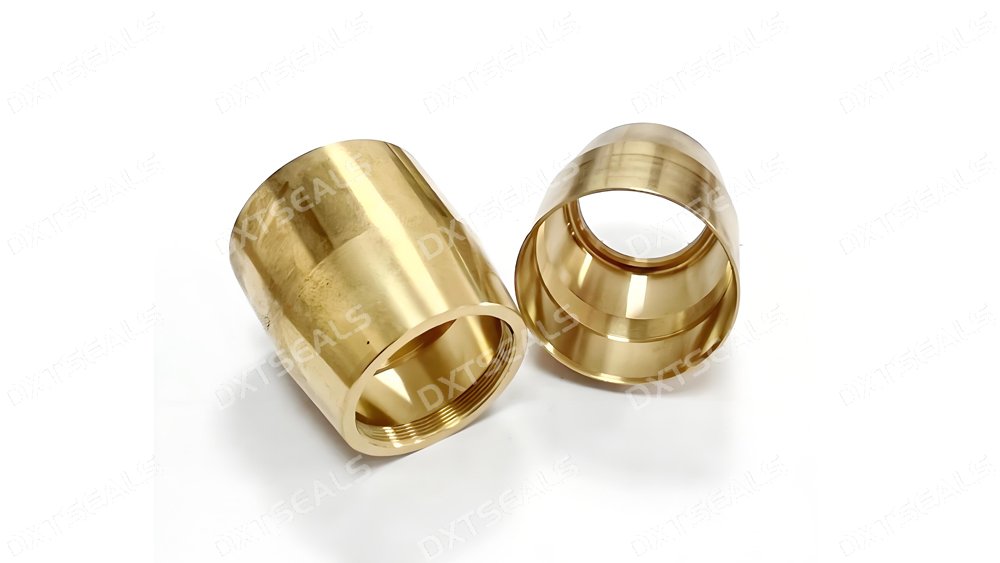
In the sealing industry, metal materials play a crucial role in ensuring strength, durability, and resistance to harsh environments. Among the most widely used metals are copper, brass, and bronze. Each material has unique mechanical and chemical properties, making it suitable for different sealing applications.
This article from DXTSEALS provides a detailed comparison of copper, brass, and bronze, helping engineers and buyers select the most appropriate material for sealing components.
1. Copper: Excellent Conductivity and Corrosion Resistance
-
Key Properties:
-
High electrical and thermal conductivity
-
Excellent corrosion resistance in fresh water and mild environments
-
Soft and ductile, easy to form into sealing components
-
-
Limitations:
-
Lower mechanical strength compared to alloys
-
Can deform under high pressure or heavy load
-
👉 Sealing Applications:
Copper is widely used in gaskets, washers, and O-ring backup rings where thermal conductivity and tight sealing are required, such as in electronics, HVAC systems, and low-pressure piping.
2. Brass: Balance of Strength and Machinability
-
Key Properties:
-
Alloy of copper and zinc
-
Higher strength and hardness than pure copper
-
Good corrosion resistance (but less than bronze)
-
Excellent machinability for precision sealing parts
-
-
Limitations:
-
Can suffer from dezincification (zinc loss) in aggressive environments
-
Not suitable for highly acidic or chloride-rich conditions
-
👉 Sealing Applications:
Brass is commonly used in fittings, valves, and threaded sealing components, where mechanical strength and ease of machining are important, such as in plumbing, hydraulic systems, and automotive sealing structures.
3. Bronze: Superior Wear and Corrosion Resistance
-
Key Properties:
-
Alloy of copper and tin (sometimes with aluminum or phosphorus)
-
Excellent wear resistance and durability
-
Superior corrosion resistance, especially in marine and industrial environments
-
High strength and load-bearing capacity
-
-
Limitations:
-
More expensive than brass
-
Slightly lower conductivity compared to pure copper
-
👉 Sealing Applications:
Bronze is widely used in bushings, bearings, and dynamic sealing parts where friction resistance and long service life are critical. It is especially suitable for marine equipment, pumps, turbines, and heavy machinery seals.
4. Quick Comparison Table
| Property | Copper | Brass | Bronze |
|---|---|---|---|
| Strength | Low | Medium | High |
| Corrosion Resistance | Good (fresh water) | Moderate | Excellent (marine/industrial) |
| Wear Resistance | Low | Medium | High |
| Conductivity | Excellent | Good | Fair |
| Machinability | Easy (soft metal) | Excellent | Moderate |
| Typical Sealing Uses | Gaskets, washers, HVAC seals | Valves, fittings, hydraulic seals | Bearings, bushings, marine seals |
5. How to Choose Between Copper, Brass, and Bronze for Sealing Applications
-
Choose Copper if thermal/electrical conductivity and soft sealing are priorities.
-
Choose Brass if you need cost-effective strength and machinability for fittings or valves.
-
Choose Bronze if the application requires high wear resistance, durability, and marine corrosion protection.
6. Conclusion
Each material—copper, brass, and bronze—offers unique advantages in sealing applications:
-
Copper for conductivity and soft sealing
-
Brass for balance of strength and machining
-
Bronze for heavy-duty and marine durability
At DXTSEALS, we provide customized sealing solutions using the right metal material for your specific industry needs, ensuring long-lasting reliability and performance.
📩 Contact DXTSEALS today for expert advice on selecting copper, brass, or bronze seals tailored to your applications.
